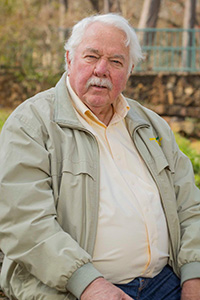Dr. Jack Turner
In August 2001, the Watershed Education Program was started as an outreach program because the center believes that reaching a child, reaches a family, which in turn reaches a community. WEC programming is designed to educate children in grades kindergarten through 12th grade about the value of aquatic environments and the need to be caretakers of our water resources. The programs are designed around South Carolina science standards. Most programs are offered at no charge.

During the center’s first year of educational outreach, over 3,389 students were reached under the leadership of Ingrid Q. Norris who only worked part-time. Ingrid began the center’s educational programming by offering just one type of program, but quickly developed a variety of programs that required a full-time educator.
Currently, the center serves more than 17,000 students and adults in our educational programming and community outreach events, and is staffed by four part-time educators. Programming has extended into the summer through Discovery Camps. Representatives of the center can also be found at special community events throughout the year.
Today, the center continues to grow. At this time, over 100 animal artifacts, specimens and live animals reside at the center. The WEC continues to pursue scientific research and development of new environmental education curriculum.
Click on plus button at the bottom of this Accordion BLOCK (not accordion tab) to create a new tab. Select Accordion TAB block to edit tab headline. Select nested blocks within accordion tab to edit content.
-
Dr. Jack Turner arrived in Spartanburg in 1974 to begin his career teaching ecology, microbiology, environmental science and plant psychology at USC Upstate (then USC Spartanburg). With a master’s in microbiology from South Dakota State University and a doctorate in ecology from the University of Oklahoma, Turner’s passion for nature captured the attention of his students and soon his love for the environment spread.
It didn’t take Turner long to venture beyond the college campus, where he sought to educate the community about environmental issues all the while working to conserve water. As he began exposing the Spartanburg community to conservation (long before “going green” became hip!), Turner recognized the need to engage the youngest of residents in environmental issues so as to build a life-long practice of conservation and protecting the environment.
“There was very little that I could see that was being taught about our effect on the environment,” said Turner. “There were pieces taught but not put together where a child could understand it.”
So, in 1999, with the help of private donors, water utilities and grants, Turner established the Watershed Ecology Center (WEC) at USC Upstate. He envisioned the Center filling the need for environmental education with scientific research on the watershed ecology of the region, community outreach, and educational programming for local schools.
The Watershed Education Program began its outreach program in August 2001. Organized to educate children in grades K-12 about the value of aquatic environments and the need to be caretakers of our water resources, the WEC programming lesson plans are grade-level specific, designed to meet South Carolina science standards, prepare students for the PACT, and are offered at no charge to the schools.
“The Watershed Ecology Center programs make complicated issues fun by being hands-on and when kids have fun, they remember,” said Turner. “We are teaching children to be good stewards of our resources and it is much easier to show children the right way to do things than to try and re-train them when they are adults.”
Turner capitalizes on the concern all children have for animals by teaching them conservation issues. “By relating all conservation issues back to an animal’s need for water, we capture the children’s attention and their desire for no creatures to be hurt. That increases their retention level of the material being taught and they become very interested as well,” said Turner.
“My third grade students get very excited when I tell them the Watershed Ecology Center is coming,” said Carolyn Hughes, a science teacher at Woodruff Elementary School. “The programs are relevant to the science standards. These high interest programs often include hands-on activities, visuals, models, games, artifacts, and both living and nonliving examples. The programs also give an awareness of the importance of water conservation and I would highly recommend them to other teachers.”
The WEC is making a definite impact in Spartanburg County —more than 65,000 school children have participated in the program since 2001. Additionally, programming has extended into the summer to include a pontoon classroom on Lake Bowen and several science camps held on campus and at the Hatcher Garden.
“Spartanburg Water’s investment in the Watershed Ecology Center is seen as investment in our community’s future,” said Sue Schneider, general manager of the Spartanburg Water System. “Engaging young people with a “hands-on” experience of water and water’s essential role in life and the community will result in a long-term understanding of the value and importance of water. This helps us preserve and protect our water resources for Spartanburg’s future.”
